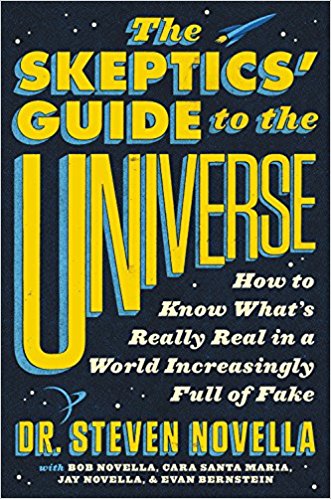Available Now!
An all-encompassing guide to skeptical thinking in the popular “The Skeptics Guide to the Universe” podcast’s dryly humorous, accessible style.
“Thorough, informative, and enlightening, The Skeptic’s Guide to the Universe inoculates you against the frailties and shortcomings of human cognition. If this book does not become required reading for us all, we may well see modern civilization unravel before our eyes.”—Neil deGrasse Tyson, Astrophysicist, American Museum of Natural History
It’s intimidating to realize that we live in a world overflowing with misinformation, bias, myths, deception, and flawed knowledge. There really are no ultimate authority figures-no one has the secret and there is no place to look up the definitive answers to our questions (not even Google). But, by thinking skeptically and logically, we can combat sloppy reasoning, bad arguments and superstitious thinking. It’s difficult, and takes a lot of vigilance, but it’s worth the effort.
In this tie-in to their incredibly popular “The Skeptics Guide to the Universe” podcast, Steven Novella, MD along with “Skeptical Rogues” Bob Novella, Cara Santa Maria, Jay Novella, and Evan Bernstein will explain the tenets of skeptical thinking and debunk some of the biggest scientific myths, fallacies and conspiracy theories (Anti-vaccines, homeopathy, UFO sightings, etc.) They’ll help us try to make sense of what seems like an increasingly crazy world using powerful tools like science and philosophy. THE SKEPTICS’ GUIDE TO THE UNIVERSE is your guide through this maze of modern life. It covers essential critical thinking skills, as well as giving insight into how your brain works and how to avoid common pitfalls in thinking. They discuss the difference between science and pseudoscience, how to recognize common science news tropes, how to discuss conspiracy theories with that crazy coworker of yours, and how to apply all of this to everyday life.
So, are you ready to join them on an epic scientific quest, one that has taken us from huddling in dark caves to stepping foot on the Moon? (Yes, we really did that.) Like all adventures, this one is foremost a journey of self discovery. The monsters you will slay and challenges you will face are mostly constructs of your own mind. With the SKEPTIC’S GUIDE TO THE UNIVERSE, we can do this together.
Where to get signed copies:
Directly from us here Signed Book
Barnes & Noble (limited run)

Booksigning Events
Tuesday, October 2
7:00pm R.J. Julia launch event
768 Boston Post Rd, Madison, CT 06443
Thursday, October 4
7:00pm Barnes & Noble
470 Universal Drive North, North Haven, CT 06473
Sunday, October 7
2:45pm – 3:45pm New York Comic Con – Science Fiction panel with Skeptics and Bill Nye
Javits Center – 655 W 34th St, New York, NY 10001
Location: Room 1A24
Monday, October 8
6pm social hour
7pm program Steven Novella will be the featured speaker at the October general meeting hosted by HFFC (Humanists and Freethinkers of Fairfield County) www.meetup.com/hffcct
Silver Star Restaurant banquet room, 210 Connecticut Avenue; Norwalk CT 06854
Tuesday, October 9
7:30pm The Strand
828 Broadway, New York, NY 10003
Praise for the Skeptics’ Guide

Kirkus review
THE SKEPTICS’ GUIDE TO THE UNIVERSE
How to Know What’s Really Real in a World Increasingly Full of Fake
[STARRED REVIEW!]
Why and how to become a skeptic. Steven Novella (Clinical Neurology/Yale Univ. School of Medicine), a founding fellow of the Institute for Science in Medicine and host and producer of the titular science and critical thinking podcast, pulls no punches in his attack on the misinformation, myths, and biases that surround us. Aided here by several writing associates, the author demonstrates his vast experience explaining the mechanisms of deception and the tactics used by pseudoscientists. To prepare readers, Novella first shows the ways in which our memories are faulty and our perceptions fallible, the glitches in our brains that trip us up, and the many logical fallacies that screw up our thinking. In lively, highly accessible prose, he helps readers understand these peculiarities and limitations and learn how to recognize deceptive claims. Science, he writes, is “the process of making our best effort to know what’s really real.” His chapters are filled with examples of pseudoscience and deception, some of which are old chestnuts, such as the “Clever Hans” effect. Others include intelligent design, pyramid schemes, exorcism, conspiracy theories, ghosts, and witches. Inevitably, some of Novella’s examples will challenge some readers’ treasured beliefs, but their inclusion here makes the challenges especially effective. As the author makes clear, some false beliefs come around again and again; new ones, however, confront us daily. A section on skepticism and the media, which looks at the difficulties of reporting science well, is rich with examples of science journalism gone wrong in the age of the internet and social media. Of special interest is the chapter on false balance, the common practice of TV news programs and documentaries giving equal coverage to two points of view that do not, in fact, have equal credibility; his prime example is climate change scientists debating climate change deniers. Presented as “one giant inoculation against bad science, deception, and faulty thinking,” the book succeeds superbly.
Reviews
“In this age of real and fake information, your ability to reason, to think in scientifically skeptical fashion, is the most important skill you can have. Read The Skeptics’ Guide Universe; get better at reasoning. And if this claim about the importance of reason is wrong, The Skeptics’ Guide will help you figure that out, too.”Bill Nye
“In his 1995 bookThe Demon-Haunted World, the great Carl Sagan prophesied a descent into superstition and ignorance. Well, that world has arrived. Fortunately, Steve Novella and his co-authors are here to help us navigate it with critical thinking and scientifically-appropriate skepticism, along the way exposing the antiscience and pseudoscience so prevalent in our public discourse today, from confirmation bias to conspiracy theories, N-Rays to Nessie, the Face on Mars, to Flat-Eartherism.”Michael Mann, Distinguished Professor, Penn State University and co-author of The Madhouse Effect: How Climate Change Denial is Threatening our Planet, Destroying our Politics, and Driving us Crazy.
“A lively, engaging, and very timely guide to navigating a world rife with misinformation and pseudoscience. This book will give you the tools to ferret out nonsense and confront your own biases-and hopefully change a few minds along the way.Jennifer Oullette, author of Me, Myself, and Why and The Calculus Diaries
“There are so many ways to be wrong, what we all need is a guidebook to being right. And here it is: The Skeptics’ Guide to the Universe is an invaluable manual to avoiding all of the ways we can fool ourselves and be fooled by others. It’s depressing to think of how many ways there are, but at least now we have no excuse for not being prepared.”Sean Carroll, author of The Big Picture: On the Origins of Life, Meaning, and the Universe Itself
“Using examples ranging from Monty Python to Monty Hall, The Skeptics Guide to the Universe offers the first ever page-turner that teaches you how to think clearly.”Paul A. Offit, MD, author of Bad Advice: Or Why Celebrities, Politicians, and Activists Aren’t Your Best Source of Health Information
“A fantastic compendium of skeptical thinking and the perfect primer for anyone who wants to separate fact from fiction.”Richard Wiseman, Professor of the Public Understanding of Psychology at University of Hertfordshire and bestselling author of 59 Seconds.
“A terrific book for anyone who wants a better understanding about the world around them and an essential guide to navigating modern life. The Skeptics’ Guide to the Universe will help readers recognize pitfalls in reasoning, combat bad arguments and avoid superstitious thinking.”Simon Singh, Skeptic & Author of Fermat’s Enigma
“A lighthearted, wide-ranging romp through pseudoscience, quackery, and nonsense of all kinds. Fun and fascinating, with an undercurrent of darker urgency-given the upsurge in bald faced lies and bizarro claims all around us, this book may be your best defense.”Steven Strogatz Professor of Mathematics, Cornell University and author of The Joy of x
“At last! A user’s guide to scientific skepticism written by some of the most prominent and influential Rogues in the Skeptical Community. From phantom Pompeii penis memories to the current fake news phenomenon, The Skeptics’ Guide to the Universe reads like a dream; casual, occasionally irreverent, full of great anecdotes and humor but ultimately a well-researched and authoritative account of the vagaries of human folly and foolishness. What I particularly like is that it is neither smug nor condescending but rather, well-intentioned and genuinely urges the reader to recognize that it is in our nature to believe nonsense but equally that we should be vigilant. This is what we have been waiting for. I will be recommending this to my students as a comprehensive guide to developing critical thinking.’Bruce Hood, author of SuperSense, The Self Illusion, and Possessed
“If there’s one thing we all need in these confusing and stressful times, it is clear thinking and accurate appraisals of the information flooding our senses. Thankfully, this book gives to the reader precisely the tools needed to bring this about. The Skeptics Guide to the Universe is an essential resource for a lifetime of critical thinking and analysis.”Michael Whelan, award-winning artist and author of The Art of Michael Whelan and Beyond Science Fiction
“Our lack of critical thinking skills and embarrassing scientific illiteracy are among the most critical issues of our time. We are drowning in a sea of myths, lies, deceptions, fakes and superstitions. We are inundated and surrounded by pseudoscience and illogic. We have lost our way. The timing couldn’t be better for the publication of a brilliant new book, The Skeptics Guide to the Universe. It’s a friendly, comprehensive, clear and direct guide to these pressing issues and guess what…it’s a hell of a lot of fun to read.”Dean Edell M.D., host of the Dr. Dean Edell Show and author of Eat Drink and Be Merry
“If everyone in the world were to read this book, we might just arrest humankind’s depressing slide into truthlessness. Someone should put the Skeptics’ Guide on the vaccination schedule.”Tim Minchin
“There’s nothing more riveting, nor more frightening, than the economy-size ability of the citizenry to embrace unscientific explanations for puzzling events. We hardly blink when ordinary folk are seduced by easy-to-grasp–if wrong–explanations for autism or mysterious lights in the night sky. But we should be alarmed. The science may be pseudo, but the grievous consequences are real. Steve Novella and colleagues offer a fascinating collection of the many contemporary phenomena now ascribed to mysterious or even conspiratorial causes. They also point out the logical errors that are repeatedly made by those who claim that the truth is out there–and frequently too far out there! For those who want to know, not merely believe, this book is an essential read. It’s also a great one.”Seth Shostak, Senior Astronomer, SETI Institute
“Steve and the gang have done it again. The Skeptics’ Guide to the Universe is the best and most popular podcast on science and skepticism out there (I am honored to have been their first guest!). And now this book is the best, soon to be the most popular, guide to what’s really real, so far as we can tell.”Massimo Pigliucci, K.D. Irani Professor of Philosophy at the City College of New York, author of Nonsense on Stilts: How to Tell Science from Bunk
“In this handbook on applying logic and reason to everyday life, Novella, a clinical neurologist at Yale University School of Medicine, expands on his podcast of the same name, assisted by the podcast’s other cast members. Seeking to give “one giant inoculation against bad science, deception, and faulty thinking,” Novella unpacks and defines false perceptions, biases, and logical fallacies while showing how emotions can overwhelm judgment and memories can lie. Putting his skepticism to use, he demonstrates how confirmation bias creates “the confident illusion that we are following the evidence,” how “good clean science blends imperceptibly into blatantly absurd pseudoscience,” and how “grand conspiracy theories… intrinsically fail within about four years.” Ghost hunter claims and free energy scams are thoroughly and precisely dismantled. In plain English and cogent prose, Novella makes skepticism seem mighty, necessary, and accessible all at once. He also shares advice on speaking to closed-minded friends or family: locate common ground, don’t be confrontational, and find the thing toward which they’re already skeptical. Empowering and illuminating, this thinker’s paradise is an antidote to spreading anti-scientific sentiments. Readers will return to its ideas again and again.”Publisher’s Weekly
“The Skeptics’ Guide To The Universe book takes everything that makes their podcast great – the depth and breadth of knowledge, down-to-earth tone, compelling personalities, and the sense that thinking skeptically is (and should be) fun – and distills it into one fantastic book. I can’t think of any other modern reference that does such a thorough and accessible job of describing what it means to be a rational thinker, and you can be sure that this is going to be my go-to gift for anyone I know that’s interested in science and the scientific process. I laughed, I learned, I loved every page of it. Get a copy of this book! “Brian Wecht










